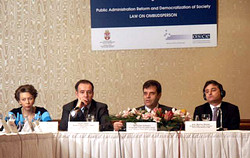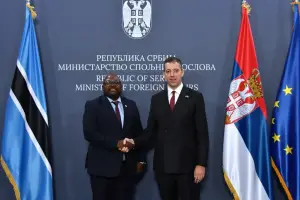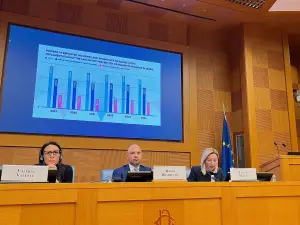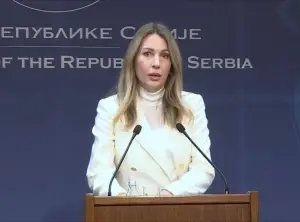Q:
A:
Ombudsman to facilitate exertion of citizens' rights
Belgrade,
22 November 2004
Serbian Prime Minister Vojislav Kostunica voiced hope today that the institution of ombudsman, which will soon be introduced in Serbia, will provide all guarantees for respect of human rights.
Opening a discussion at a round table entitled "Reform of public administration and democratisation of society", Kostunica pointed out that the establishment of the institution of ombudsman is an additional element, but one of importance, aimed at facilitating the exertion of existing citizen rights.
The ombudsman is an independent body that enjoys full confidence, protects citizens' rights from illegal or improper work of public administration and reacts in cases when the administration is unjustifiably slow or inefficient. In addition to this responsibility, it supervises the work of public administration.
The Prime Minister said that an ombudsman draft law will soon be discussed at a government session. With this law, Serbia will join a family of 130 countries that have or have recently introduced this institution.
Kostunica pointed out that the main goal of the public administration reform is to provide high quality services to citizens and to build a competent and responsible administration that satisfies citizens' needs. The first step is to reform the legislative framework, he noted. In this way, a legal basis will be created for the implementation of the basic principles of a modern democratic state, namely decentralisation, depolitisation, professionalisation and modernisation.
Kostunica pointed out that the overall democratisation of a society and the building of institutions on the principles of the rule of law hold their roots in the accountability and transparence of work of state bodies, a main programme commitment of the Serbian government.
Head of the OSCE Mission to Serbia-Montenegro Maurizio Massari said that the ombudsman, who is tasked with offering citizens assistance in the protection of human rights regardless of their ethnic background, has proved to be an efficient tool against injustices done to citizens by public administration resulting from abuse of power and administration.
Massari pointed out that the role of ombudsman is very important in the functioning of democracy. He added that this requires a solid normative framework and participation of a wider political spectre and that a majority should be secured in the Serbian parliament to ensure introduction of this institution.
The institution of ombudsman should also be included in the new constitution of Serbia, according to Massari, and the OSCE mission will offer all assistance necessary so that the ombudsman's office could start working as soon as possible.
Serbian Minister of Public Administration and Local Self-Government Zoran Loncar said that the Serbian government will do its level best to push the ombudsman law through the parliament by the end of the year. He said that radical and resolute reforms in the field of public administration are necessary at the moment.
He recalled that the Serbian government has prepared a bill on public administration that is based on depolitisation and professionalisation principles, as well as a bill on state subsidies. Also, two important process laws that are expected to boost efficiency of public administration and its supervision are currently being prepared. These bills specifically address administrative procedure and the resolution of administrative disputes.
On the eve of tomorrow's session of the UN Security Council, at which Chief Prosecutor of The Hague Tribunal Carla del Ponte will submit a report on the cooperation of western Balkan countries with the tribunal, Prime Minister Kostunica said that the Serbian government is meeting its international obligations and reiterated that cooperation with the tribunal is necessary.
Kostunica said that Minister Loncar will attend the debate in the UN Security Council. He will present all data on cooperation with the tribunal, such as the cases of the voluntary surrender of indictee Ljubisa Beara and the suspension of the obligation of keeping state and military secrets to a greater number of witnesses and civil servants, including those from Serbia. According to Kostunica, there will also be a presentation of documentation, activities and efforts which Serbia and the state union has done to fulfill international obligations.
He expressed wish that much more had been done in this field, but said that certain things cannot be achieved at once. According to Kostunica, the Serbian government is firmly committed to cooperation with the tribunal. He noted that there is much to be satisfied with, but that there is much more to be done and that the government is committed to this work.
The ombudsman is an independent body that enjoys full confidence, protects citizens' rights from illegal or improper work of public administration and reacts in cases when the administration is unjustifiably slow or inefficient. In addition to this responsibility, it supervises the work of public administration.
The Prime Minister said that an ombudsman draft law will soon be discussed at a government session. With this law, Serbia will join a family of 130 countries that have or have recently introduced this institution.
Kostunica pointed out that the main goal of the public administration reform is to provide high quality services to citizens and to build a competent and responsible administration that satisfies citizens' needs. The first step is to reform the legislative framework, he noted. In this way, a legal basis will be created for the implementation of the basic principles of a modern democratic state, namely decentralisation, depolitisation, professionalisation and modernisation.
Kostunica pointed out that the overall democratisation of a society and the building of institutions on the principles of the rule of law hold their roots in the accountability and transparence of work of state bodies, a main programme commitment of the Serbian government.
Head of the OSCE Mission to Serbia-Montenegro Maurizio Massari said that the ombudsman, who is tasked with offering citizens assistance in the protection of human rights regardless of their ethnic background, has proved to be an efficient tool against injustices done to citizens by public administration resulting from abuse of power and administration.
Massari pointed out that the role of ombudsman is very important in the functioning of democracy. He added that this requires a solid normative framework and participation of a wider political spectre and that a majority should be secured in the Serbian parliament to ensure introduction of this institution.
The institution of ombudsman should also be included in the new constitution of Serbia, according to Massari, and the OSCE mission will offer all assistance necessary so that the ombudsman's office could start working as soon as possible.
Serbian Minister of Public Administration and Local Self-Government Zoran Loncar said that the Serbian government will do its level best to push the ombudsman law through the parliament by the end of the year. He said that radical and resolute reforms in the field of public administration are necessary at the moment.
He recalled that the Serbian government has prepared a bill on public administration that is based on depolitisation and professionalisation principles, as well as a bill on state subsidies. Also, two important process laws that are expected to boost efficiency of public administration and its supervision are currently being prepared. These bills specifically address administrative procedure and the resolution of administrative disputes.
On the eve of tomorrow's session of the UN Security Council, at which Chief Prosecutor of The Hague Tribunal Carla del Ponte will submit a report on the cooperation of western Balkan countries with the tribunal, Prime Minister Kostunica said that the Serbian government is meeting its international obligations and reiterated that cooperation with the tribunal is necessary.
Kostunica said that Minister Loncar will attend the debate in the UN Security Council. He will present all data on cooperation with the tribunal, such as the cases of the voluntary surrender of indictee Ljubisa Beara and the suspension of the obligation of keeping state and military secrets to a greater number of witnesses and civil servants, including those from Serbia. According to Kostunica, there will also be a presentation of documentation, activities and efforts which Serbia and the state union has done to fulfill international obligations.
He expressed wish that much more had been done in this field, but said that certain things cannot be achieved at once. According to Kostunica, the Serbian government is firmly committed to cooperation with the tribunal. He noted that there is much to be satisfied with, but that there is much more to be done and that the government is committed to this work.











